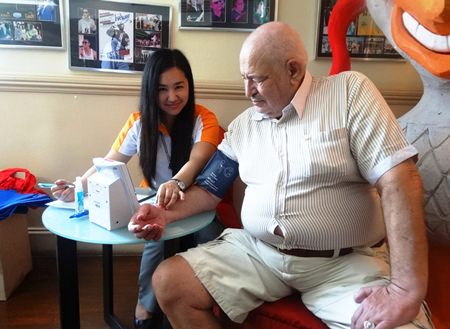The current Ebola outbreak is ten times bigger than past outbreaks and still growing. Ms. Jenny Lee Walsh, a Consultant in Nursing Service from Bangkok Hospital Pattaya spoke to the Pattaya City Expats Club last on Sunday, September 14 about the latest outbreak.
Jenny explained that Ebola is a disease of humans and other primates. There are five sub types of the Ebola virus, four of which are found in humans. The virus sometimes mutates a little in each infected person, making it hard to treat. Further, the virus produces a haemorrhagic (or inflammatory) response which leads to the rupture of blood vessels. She mentioned that every virus has a host, a reservoir, where it can live without infecting the host; for the Ebola virus it is still unknown, but evidence suggests it is most likely the fruit bat.
 Jenny Lee Walsh, a Consultant in Nursing Service from Bangkok Hospital Pattaya, speaks to the PCEC about the latest Ebola outbreak in Africa. She gave a brief history of past outbreaks and explained why the latest is the most significant.
Jenny Lee Walsh, a Consultant in Nursing Service from Bangkok Hospital Pattaya, speaks to the PCEC about the latest Ebola outbreak in Africa. She gave a brief history of past outbreaks and explained why the latest is the most significant.
The incubation period for the Ebola virus is 2 to 21 days from exposure, meaning it can take up to 21 days before a person starts showing symptoms. In most cases, however, symptoms show up by Day 10. The first symptoms resemble those of the flu: headache, sore throat, muscle aches, etc. Then, other symptoms appear, such as chest pains, red eyes, loss of appetite, diarrhea, skin rashes, and difficulty breathing and swallowing.
Jenny provided information on the first outbreak in 1976 in Africa and subsequent outbreaks. These outbreaks were in local villages and died out after infecting a few hundred people. The 2014 outbreak is believed to have started in December 2013 when a two-year-old boy in Guinea died, possibly after being bitten by a bat. The boy’s mother, older sister and grandmother became symptomatic and also died, as did a nurse and the village midwife. The virus spread to other villages, and then to neighbouring countries Liberia and Sierra Leone. As of mid-September, there were just over 4,000 cases suspected or confirmed in West Africa; the mortality rate stood at 53%. Jenny said that the reported caseload is understated because people are reluctant to report; there is a general distrust of governments and hospitals; and there is limited access to laboratories for testing.
 PCEC MC Richard Silverberg presents a Certificate of Appreciation to Jenny Lee Walsh for her informative talk about the latest Ebola outbreak and the efforts being undertaken to restrict the spread of this virus.
PCEC MC Richard Silverberg presents a Certificate of Appreciation to Jenny Lee Walsh for her informative talk about the latest Ebola outbreak and the efforts being undertaken to restrict the spread of this virus.
Fourteen of Liberia’s 15 counties have now reported confirmed cases. As soon as a new Ebola treatment facility is opened, Jenny said, it immediately fills to overflowing with patients. At least 152 health care workers have been infected and 79 have died. When the outbreak began, Liberia had only one doctor to treat every 100,000 people in a total population of 4.4 million people. Every infection or death of a doctor or nurse significantly depletes response capacity.
Jenny said that the demands of the Ebola outbreak have completely outstripped the capacity to respond. Among the challenges: lack of space in treatment centres (the centres have become end of life care facilities); lack of protective gear; lack of running water; the isolation centres are overwhelmed (including not having enough food); riots are breaking out (partially due to the fact that the quarantine time is three weeks); and there is a lack of community engagement.
One worrying aspect of the latest outbreak is that cases have been recorded in cities, Jenny said. Previous outbreaks were confined to rural areas. Another concern is that the rate of reported infections is increasing.
Ebola is not highly contagious. It is not an airborne disease like, for example, the avian flu. A person can contract Ebola directly from a fruit bat, for example, being bitten or eating a soup in which fruit bats was one of the ingredients or by eating an animal that is infected. Jenny said that the Ebola virus can spread from person to person usually only through direct contact with body fluids. The virus can also be spread indirectly through contaminated objects such as needles.
 A nurse from Bangkok Hospital Pattaya provided free blood pressure checks to members and guests at the Sunday, September 14 meeting of the PCEC.
A nurse from Bangkok Hospital Pattaya provided free blood pressure checks to members and guests at the Sunday, September 14 meeting of the PCEC.
Burial ceremonies where mourners wash the body of the deceased and have direct contact with the body of the deceased person – quite common in African culture and in the Muslim religion – can also play a role in the transmission of Ebola, Jenny explained. In these cases, the virus will usually enter the body of the mourner through a cut in the skin or a mucous membrane.
There is no specific treatment and no cure. The best treatment is to manage the symptoms, ensure that the patient is well hydrated, and provide supportive care. The earlier a case is detected, the better the chances of survival. The key is to avoid having the patient go into shock due to a lack of fluids. At the community level, the best strategy is to isolate known patients, trace contacts, identify the source person and conduct community awareness and education campaigns.
There are vaccines under development; the process of testing them to prove that they are safe is being rushed given the current circumstances. If the vaccines are proven safe, Jenny believes that the priority will be given to health care workers.
The global community has been slow to respond. It was not until last month that the World Health Organization (WHO) declared the Ebola outbreak to be a public health emergency of international concern. The goal of WHO is to limit the spread in countries that have experienced outbreaks, and prevent the spread to other countries. Exit screenings have been set up at international airports, seaports and land crossings in the countries that have outbreaks. Travellers arriving in other countries with an unexplained febrile illness are being isolated and tested.
After Jenny concluded her presentation, Master of Ceremonies Richard Silverberg brought everyone up to date on upcoming events and called on Roy Albiston to conduct the always informative Open Forum where questions are asked and answered about Expat living in Thailand, especially Pattaya.
For more information on the PCEC’s many activities, visit their website at www.pcecclub.org.




